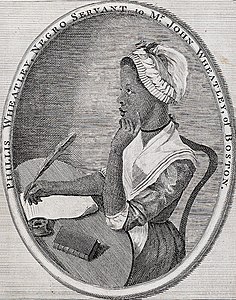Analysis of To A Clergyman On The Death Of His Lady
Phillis Wheatley 1753 (West Africa) – 1784 (Boston)
WHERE contemplation finds her sacred spring,
Where heav'nly music makes the arches ring,
Where virtue reigns unsully'd and divine,
Where wisdom thron'd, and all the graces shine,
There sits thy spouse amidst the radiant throng,
While praise eternal warbles from her tongue;
There choirs angelic shout her welcome round,
With perfect bliss, and peerless glory crown'd.
While thy dear mate, to flesh no more confin'd,
Exults a blest, an heav n-ascended mind,
Say in thy breast shall floods of sorrow rise?
Say shall its torrents overwhelm thine eyes?
Amid the seats of heav'n a place is free,
And angels open their bright ranks for thee;
For thee they wait, and with expectant eye
Thy spouse leans downward from th' empyreal sky:
"O come away," her longing spirit cries,
"And share with me the raptures of the skies.
"Our bliss divine to mortals is unknown;
"Immortal life and glory are our own.
"There too may the dear pledges of our love
"Arrive, and taste with us the joys above;
"Attune the harp to more than mortal lays,
"And join with us the tribute of their praise
"To him, who dy'd stern justice to stone,
"And make eternal glory all our own.
"He in his death slew ours, and, as he rose,
"He crush'd the dire dominion of our foes;
"Vain were their hopes to put the God to flight,
"Chain us to hell, and bar the gates of light."
She spoke, and turn'd from mortal scenes her eyes,
Which beam'd celestial radiance o'er the skies.
Then thou dear man, no more with grief retire,
Let grief no longer damp devotion's fire,
But rise sublime, to equal bliss aspire,
Thy sighs no more be wafted by the wind,
No more complain, but be to heav'n resign'd
'Twas thine t' unfold the oracles divine,
To sooth our woes the task was also thine;
Now sorrow is incumbent on thy heart,
Permit the muse a cordial to impart;
Who can to thee their tend'rest aid refuse?
To dry thy tears how longs the heav'nly muse!
| Scheme | AABBCDEEFFGGHHIIGGJJKKLLJJMMNNGGOPOFFBBQQRR |
|---|---|
| Poetic Form | |
| Metre | 101010101 111010101 11011001 1101010101 11110101001 1101010101 111010101 1011010101 1111111101 01011110101 1011111101 111100111 0101110111 0101011111 1111010101 1111011111 1101010101 011101101 10101110101 01010101101 11101101101 0101110101 0101111101 0111010111 111111011 01010101101 10111100111 11010101101 1011110111 1111010111 1101110101 110101001001 1111111101 111101110 1101110101 1111110101 1101111101 11101010001 11101011101 1101010111 0101010101 1111111101 111111011 |
| Closest metre | Iambic pentameter |
| Characters | 1,869 |
| Words | 345 |
| Sentences | 11 |
| Stanzas | 1 |
| Stanza Lengths | 43 |
| Lines Amount | 43 |
| Letters per line (avg) | 34 |
| Words per line (avg) | 8 |
| Letters per stanza (avg) | 1,467 |
| Words per stanza (avg) | 341 |
Font size:
Submitted on May 13, 2011
Modified on April 28, 2023
- 1:47 min read
- 111 Views
Citation
Use the citation below to add this poem analysis to your bibliography:
Style:MLAChicagoAPA
"To A Clergyman On The Death Of His Lady" Poetry.com. STANDS4 LLC, 2024. Web. 29 Apr. 2024. <https://www.poetry.com/poem-analysis/29380/to-a-clergyman-on-the-death-of-his-lady>.


Discuss this Phillis Wheatley poem analysis with the community:
Report Comment
We're doing our best to make sure our content is useful, accurate and safe.
If by any chance you spot an inappropriate comment while navigating through our website please use this form to let us know, and we'll take care of it shortly.
Attachment
You need to be logged in to favorite.
Log In